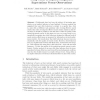Free Online Productivity Tools
i2Speak
i2Symbol
i2OCR
iTex2Img
iWeb2Print
iWeb2Shot
i2Type
iPdf2Split
iPdf2Merge
i2Bopomofo
i2Arabic
i2Style
i2Image
i2PDF
iLatex2Rtf
Sci2ools
100
click to vote
ECIR
2008
Springer
2008
Springer
Using Clicks as Implicit Judgments: Expectations Versus Observations
Abstract. Clickthrough data has been the subject of increasing popularity as an implicit indicator of user feedback. Previous analysis has suggested that user click behaviour is subject to a quality bias--that is, users click at different rank positions when viewing effective search results than when viewing less effective search results. Based on this observation, it should be possible to use click data to infer the quality of the underlying search system. In this paper we carry out a user study to systematically investigate how click behaviour changes for different levels of search system effectiveness as measured by information retrieval performance metrics. Our results show that click behaviour does not vary systematically with the quality of search results. However, click behaviour does vary significantly between individual users, and between search topics. This suggests that using direct click behaviour--click rank and click frequency--to infer the quality of the underlying searc...
| Added | 29 Oct 2010 |
| Updated | 29 Oct 2010 |
| Type | Conference |
| Year | 2008 |
| Where | ECIR |
| Authors | Falk Scholer, Milad Shokouhi, Bodo Billerbeck, Andrew Turpin |
Comments (0)

